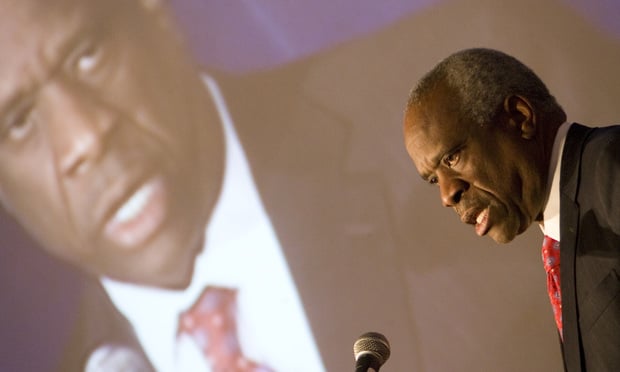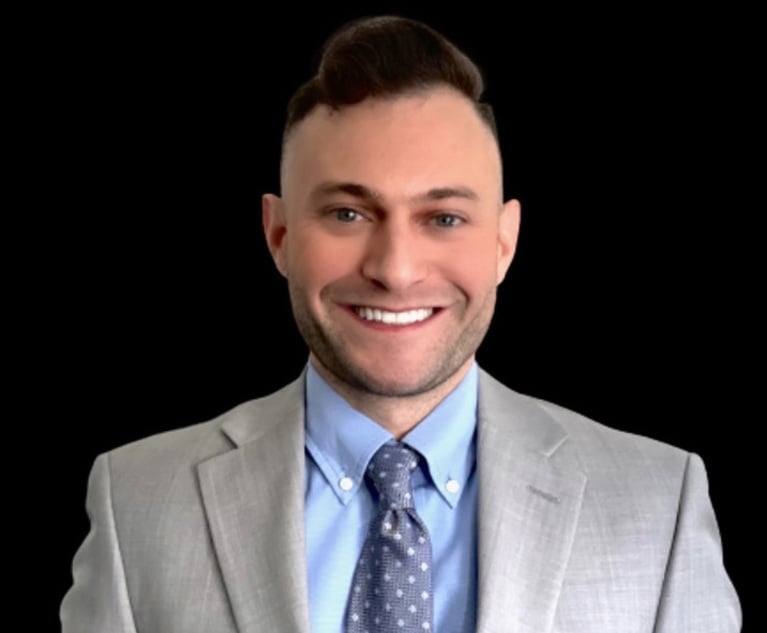Supreme Court Blesses Trump Rule Curtailing Obamacare's Contraceptive Mandate
Justice Ruth Bader Ginsburg, joined by Justice Sonia Sotomayor, said in dissent: "Today, for the first time, the court casts totally aside countervailing rights and interests in its zeal to secure religious rights to the nth degree."
July 08, 2020 at 10:33 AM
4 minute read
 U.S. Supreme Court Justice Clarence Thomas/photo by Diego Radzinschi/NLJ
U.S. Supreme Court Justice Clarence Thomas/photo by Diego Radzinschi/NLJ
The Trump administration had legal authority to allow private employers with moral or religious objections to opt out of providing birth control health insurance required under the Affordable Care Act, the U.S. Supreme Court ruled on Wednesday.
"We hold today that the departments had the statutory authority to craft that [religious] exemption, as well as the contemporaneously issued moral exemption," Justice Clarence Thomas wrote for a 7-2 majority. "We further hold that the rules promulgating these exemptions are free from procedural defects."
Justice Ruth Bader Ginsburg, joined by Justice Sonia Sotomayor, dissented.
"In accommodating claims of religious freedom, this court has taken a balanced approach, one that does not allow the religious beliefs of some to overwhelm the rights and interests of others who do not share those beliefs," Ginsburg wrote. "Today, for the first time, the court casts totally aside countervailing rights and interests in its zeal to secure religious rights to the nth degree."
Justice Elena Kagan, joined by Justice Stephen Breyer, concurred in the majority's result but not its reasoning.
The court's decision marked the third time the justices have considered the contraceptive insurance requirement since the federal law was enacted in 2010. The government estimates that under the Trump administration's expanded exemptions between 70,500 and 126,400 women would lose access to cost-free birth control in one year.
This latest dispute centered on the administration's 2017 effort to grant categorical exemptions, sometimes called the "conscience exemptions," to for-profit and nonprofit employers. The Obama administration had created narrower exemptions for churches and other houses of worship, and offered "accommodations" for religiously affiliated organizations, such as hospitals and universities, by which they would not directly contribute to the cost of the insurance.
In the combined cases Little Sisters of the Poor v. Pennsylvania and Trump v. Pennsylvania, the states of Pennsylvania and New Jersey challenged the Trump exemptions, arguing that they were not authorized—as claimed by the administration—by the Affordable Care Act and the Religious Freedom Restoration Act.
The states also argued that the Trump administration violated the federal Administrative Procedure Act when it issued the first interim rules in 2017 expanding the exemptions without first providing notice and an opportunity for public comment. That violation, they argued, made the final rules in 2018 invalid. The U.S. Court of Appeals for the Third Circuit ruled in favor of the states and upheld a nationwide injunction against their enforcement.
During telephonic arguments in May, U.S. Solicitor General Noel Francisco, defending the Trump administration, countered, "There is nothing in the ACA" that requires contraceptive coverage. The Obama administration's signature health care law delegates to the enforcing agencies the decision whether to provide it, he said.
The administration, in its appeal, also had asked the justices to weigh in on the appropriateness of nationwide injunctions. The court did not reach that issue in Wednesday's ruling.
Challenging the administration's exemptions, Pennsylvania Chief Deputy Attorney General Michael Fischer argued that "the moral and religious exemptions rest on sweeping claims of authority." He said they would allow any employer to opt out entirely from providing the coverage, including for "vaguely defined moral beliefs."
The prior rules, Fischer said, struck a balance. "This case is not the result of a long-running dispute but an extension of authority inconsistent with Congress and the courts," he argued.
Chief Justice John Roberts Jr. and Justice Stephen Breyer voiced frustration that the contraceptive insurance issue was before them once again.
"Well, the problem is neither side in this debate wants the accommodation to work," Roberts said at one point. "Is it really the case that there's no way to resolve those differences?"
The point of the Constitution's religion clauses is "to try to work out accommodations," said Breyer. "I don't understand why this can't be worked out."
But Ginsburg, in a comment to Kirkland & Ellis' Paul Clement, representing Little Sisters, stated, "At the end of the day, the government is throwing to the winds women's entitlement to seamless, no cost to them, contraceptive coverage. This idea that the balance has to be all for Little Sister-type organizations and not at all for women seems to rub against our history of accommodation, tolerance and respect for divergent views."
Read today's opinion:
This is a developing report and will be updated.
This content has been archived. It is available through our partners, LexisNexis® and Bloomberg Law.
To view this content, please continue to their sites.
Not a Lexis Subscriber?
Subscribe Now
Not a Bloomberg Law Subscriber?
Subscribe Now
NOT FOR REPRINT
© 2025 ALM Global, LLC, All Rights Reserved. Request academic re-use from www.copyright.com. All other uses, submit a request to [email protected]. For more information visit Asset & Logo Licensing.
You Might Like
View All
'Religious Discrimination'?: 4th Circuit Revives Challenge to Employer Vaccine Mandate
2 minute read
'Pull Back the Curtain': Ex-NFL Players Seek Discovery in Lawsuit Over League's Disability Plan


Fatal Shooting of CEO Sets Off Scramble to Reassess Executive Security
5 minute readLaw Firms Mentioned
Trending Stories
- 1'Didn't Notice Patient Wasn't Breathing': $13.7M Verdict Against Anesthesiologists
- 2'Astronomical' Interest Rates: $1B Settlement to Resolve Allegations of 'Predatory' Lending Cancels $534M in Small-Business Debts
- 3Senator Plans to Reintroduce Bill to Split 9th Circuit
- 4Law Firms Converge to Defend HIPAA Regulation
- 5Judge Denies Retrial Bid by Ex-U.S. Sen. Menendez Over Evidentiary Error
Who Got The Work
J. Brugh Lower of Gibbons has entered an appearance for industrial equipment supplier Devco Corporation in a pending trademark infringement lawsuit. The suit, accusing the defendant of selling knock-off Graco products, was filed Dec. 18 in New Jersey District Court by Rivkin Radler on behalf of Graco Inc. and Graco Minnesota. The case, assigned to U.S. District Judge Zahid N. Quraishi, is 3:24-cv-11294, Graco Inc. et al v. Devco Corporation.
Who Got The Work
Rebecca Maller-Stein and Kent A. Yalowitz of Arnold & Porter Kaye Scholer have entered their appearances for Hanaco Venture Capital and its executives, Lior Prosor and David Frankel, in a pending securities lawsuit. The action, filed on Dec. 24 in New York Southern District Court by Zell, Aron & Co. on behalf of Goldeneye Advisors, accuses the defendants of negligently and fraudulently managing the plaintiff's $1 million investment. The case, assigned to U.S. District Judge Vernon S. Broderick, is 1:24-cv-09918, Goldeneye Advisors, LLC v. Hanaco Venture Capital, Ltd. et al.
Who Got The Work
Attorneys from A&O Shearman has stepped in as defense counsel for Toronto-Dominion Bank and other defendants in a pending securities class action. The suit, filed Dec. 11 in New York Southern District Court by Bleichmar Fonti & Auld, accuses the defendants of concealing the bank's 'pervasive' deficiencies in regards to its compliance with the Bank Secrecy Act and the quality of its anti-money laundering controls. The case, assigned to U.S. District Judge Arun Subramanian, is 1:24-cv-09445, Gonzalez v. The Toronto-Dominion Bank et al.
Who Got The Work
Crown Castle International, a Pennsylvania company providing shared communications infrastructure, has turned to Luke D. Wolf of Gordon Rees Scully Mansukhani to fend off a pending breach-of-contract lawsuit. The court action, filed Nov. 25 in Michigan Eastern District Court by Hooper Hathaway PC on behalf of The Town Residences LLC, accuses Crown Castle of failing to transfer approximately $30,000 in utility payments from T-Mobile in breach of a roof-top lease and assignment agreement. The case, assigned to U.S. District Judge Susan K. Declercq, is 2:24-cv-13131, The Town Residences LLC v. T-Mobile US, Inc. et al.
Who Got The Work
Wilfred P. Coronato and Daniel M. Schwartz of McCarter & English have stepped in as defense counsel to Electrolux Home Products Inc. in a pending product liability lawsuit. The court action, filed Nov. 26 in New York Eastern District Court by Poulos Lopiccolo PC and Nagel Rice LLP on behalf of David Stern, alleges that the defendant's refrigerators’ drawers and shelving repeatedly break and fall apart within months after purchase. The case, assigned to U.S. District Judge Joan M. Azrack, is 2:24-cv-08204, Stern v. Electrolux Home Products, Inc.
Featured Firms
Law Offices of Gary Martin Hays & Associates, P.C.
(470) 294-1674
Law Offices of Mark E. Salomone
(857) 444-6468
Smith & Hassler
(713) 739-1250










